What are the Impacts of the Russia-Ukraine War on Global Food Security?

In late February 2022, Russia started full-scale military operations against Ukraine. Russia and Ukraine are both considered major agricultural commodities suppliers in the global market, particularly in the cereals and sunflower oil markets. According to statistics, in 2020, pre-war Russia and Ukraine took 72.7% share in the global sunflower oil and seeds trade and 34.1% share in the global wheat trade (see Chart 1 below).
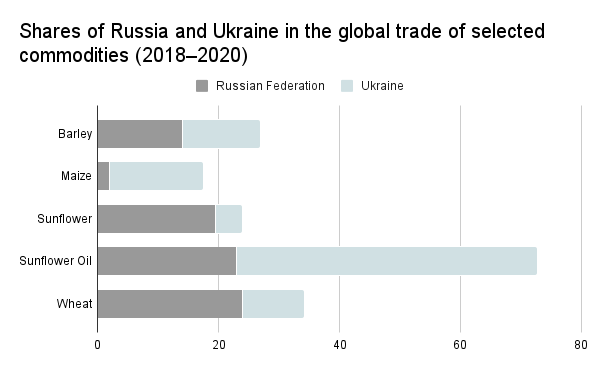
Source: Glauber and Laborde Data
The ongoing war in Ukraine has had several significant impacts on global food security such as disrupting production, trade, and pricing of significant agricultural commodities. Given that Ukraine is a significant food provider to sizable markets in Asia, Africa, and Europe, international governments and organizations express concern over an impending food crisis. The FAO Food Price Index shows that global food costs have reportedly risen to their highest level since 1990. The World Bank warns that rising costs could harm net food importers, which are mainly developing nations. Looking at Chart 2, commodity prices for maize and wheat have been constantly increasing. Significant increase was observed in early March 2022 when the war began.
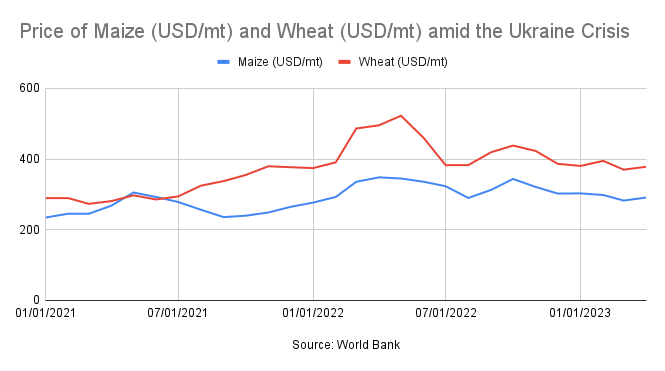
The war has had a significant impact on the overall production of main agricultural commodities in Ukraine, one of the main suppliers in global trade of food commodities. Some estimates show that in 2023, the corn crop in Ukraine will decrease to 21 million metric tons (mt–);nearly a 50% fall compared to pre-war crop volumes of 42 million mt in 2021. As for wheat, harvest in 2023 is expected to be around 16 to 17 million mt, also a 50% decline compared to pre-war harvest volumes of 33 million mt in 2021. United States Department of Agriculture (USDA) data shows that in 2022, total sunflower oil production in Ukraine was recorded around 4.1 million mt, also nearly a 50% decline in production compared with the pre-war period.
The war in Ukraine has destroyed tremendous agricultural areas in the country, which used to be the “breadbasket” for many nations across the world. Agriculture and food products accounted for 27.7 billion USD, or 40.7% of Ukraine's total exports in 2021. Three key products, such as corn, wheat, and sunflower oil, are essential for food production all over the world. Ukraine exported 20.1 million tons of wheat for a total value of 5.1 billion USD in 2021. Ukraine's wheat was primarily consumed by Asian and African nations (11.9 million tons and 7.6 million tons, respectively).
Chart 3 below shows that major wheat consumers from Ukraine are countries in the Middle East and North Africa (MENA) region, Asia and Africa. These countries are heavily dependent on foreign imports and any changes in the global market can significantly impact their economies. Ukraine sold 3.1 million tons of wheat to Indonesia and Egypt, two of the most populous nations in their respective regions. Disruption in supply of Ukrainian wheat may endanger food security in Asian and African countries.
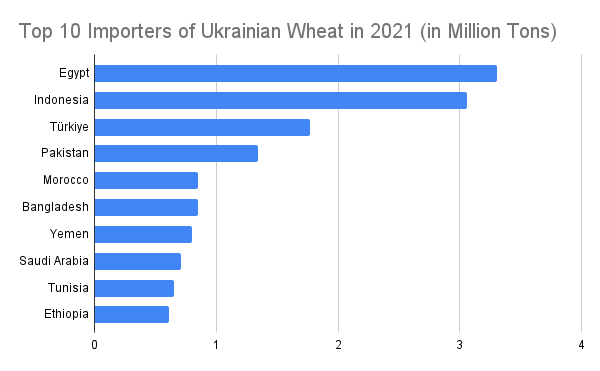
Source: State Statistics Service of Ukraine
In Chart 4 below, 24.5 million tons of maize crops were exported from Ukraine in 2021. Asia is the top export destination with a total of 13.4 million tons of Ukrainian grain consumed, 7.9 million tons of which went to China. European nations come in at the second spot with 8.1 million tons. Only 3.2 million tons of corn were shipped from Ukraine to African nations, but Egypt, with 2.2 million tons, continued to be the region's largest customer.
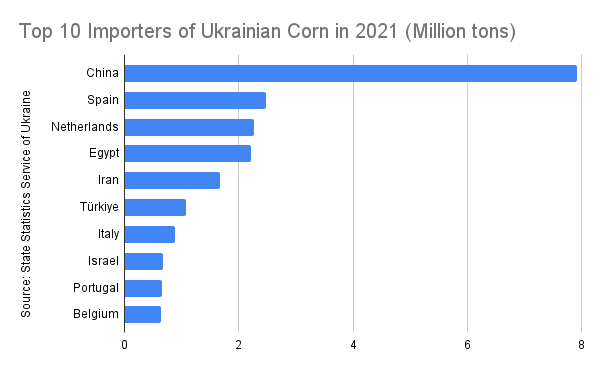
Source: State Statistics Service of Ukraine
Ukraine is the world leader in production and export of sunflower oil. As can be seen in Chart 4, sunflower oil exports from Ukraine totaled 5.1 million tons and 6.4 billion USD in 2021. With 3.2 million tons, Asian nations such as China and India were the primary buyers of Ukrainian sunflower oils. Sunflower oil, which is used mainly as cooking oil, is an important commodity in global food security.
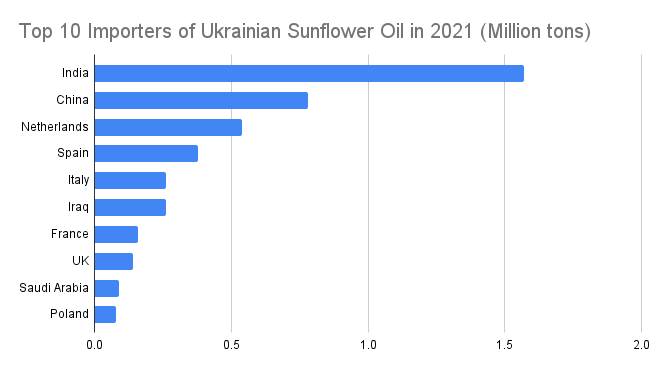
Source: State Statistics Service of Ukraine
In conclusion, the war in Ukraine caused instability in global food security since both Russia and Ukraine are important suppliers of essential food products. Ukraine’s agriculture infrastructure was seriously damaged while Russia's agricultural exports have been hit by Western sanctions for its aggression towards Ukraine. The war has harmed Ukrainian agricultural companies' supply networks, reducing the amount of land suitable for planting, and cutting off Ukraine from maritime channels. All these events led to a supply disruption, resulting in a severe shortage and a sharp increase in prices of major agricultural commodities. If the war in Ukraine does not end soon, economic stagnation will spread to other countries. Food crises could arise in poor and densely populated nations in Africa and Asia due to supply issues from Russia and Ukraine.



